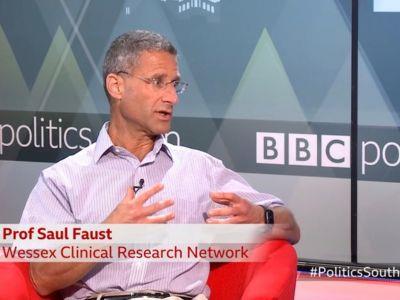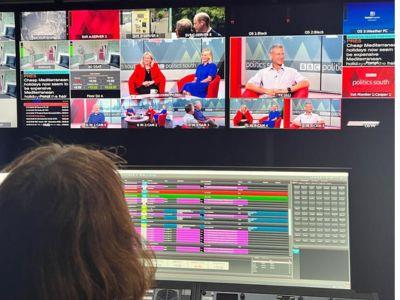Bright future for clinical research presented on BBC Politics South

Clinical research in Wessex is in good health and there are lots of new ways to take part, Professor Saul Faust has told BBC’s Politics South.
The Southampton professor praised the public’s ongoing response to clinical trials while highlighting a growing network of research hubs in the region.
Prof Faust is the Clinical Director of the National Institute for Health and Care Research (NIHR) Clinical Research Network (CRN) Wessex. He is a professor at the University of Southampton and Director of the NIHR Southampton Clinical Research Facility.

The programme is available to view in full for one month on BBC iPlayer (clip starts at 7minutes 15seconds).
‘Public are really engaged’
Sunday’s broadcast considered the future of clinical research in the wake of COVID-19. Prof Faust explained there is a good pipeline of work stretching into the future.

“The public are really engaged,” said Prof Faust, when questioned over the willingness of people to continue stepping up. “They are really willing to come forward and take part in trials, both in hospitals and out in the community.”
“We’ve seen ongoing investment from some of the big pharmaceutical companies and SMEs to come to the UK and work with us to get their trials done,” he added.
In the Wessex area, Prof Faust said, collaboration has been key. By bringing together universities, local authorities, the NHS and the new infrastructure of Wessex Health Partners - everyone involved in health and care research is working together as much as possible.
However, he pointed out there is still more work to do, moving forward. “Clinical trials are really important to the health of the economy,” he explained. “Life sciences is one of the biggest sectors in the country. Successive governments have invested in life sciences and the NIHR and we now have a duty to work across sectors, public and industry, to make sure we’re able to explain what we need to do, and then involve the public in clinical trials.”
Looking to the future
When asked about the health of life sciences in the south of England, Prof Faust set out his ideas for future improvements.

“We need to make trials easier for people to take part in, and easier for the NHS to do as part of routine care,” he said. “That involves training our entire workforce - doctors, nurses, assistants and those working in social care - how to do research as part of their daily jobs. And we need the public to keep coming forward.”
The NIHR CRN in Wessex has a network of four research hubs up and running, which invite people from local communities to come and take part in clinical trials. These are based in Southampton, Bournemouth, Portsmouth and Weymouth.
“We’ve been able to open research hubs in all these places, and our newest hub in Weymouth is right in the middle of one of the most socially and economically deprived coastal communities in the country,” said Prof Faust. “We’re open there and we need people to come forward to take part in all these trials.”




